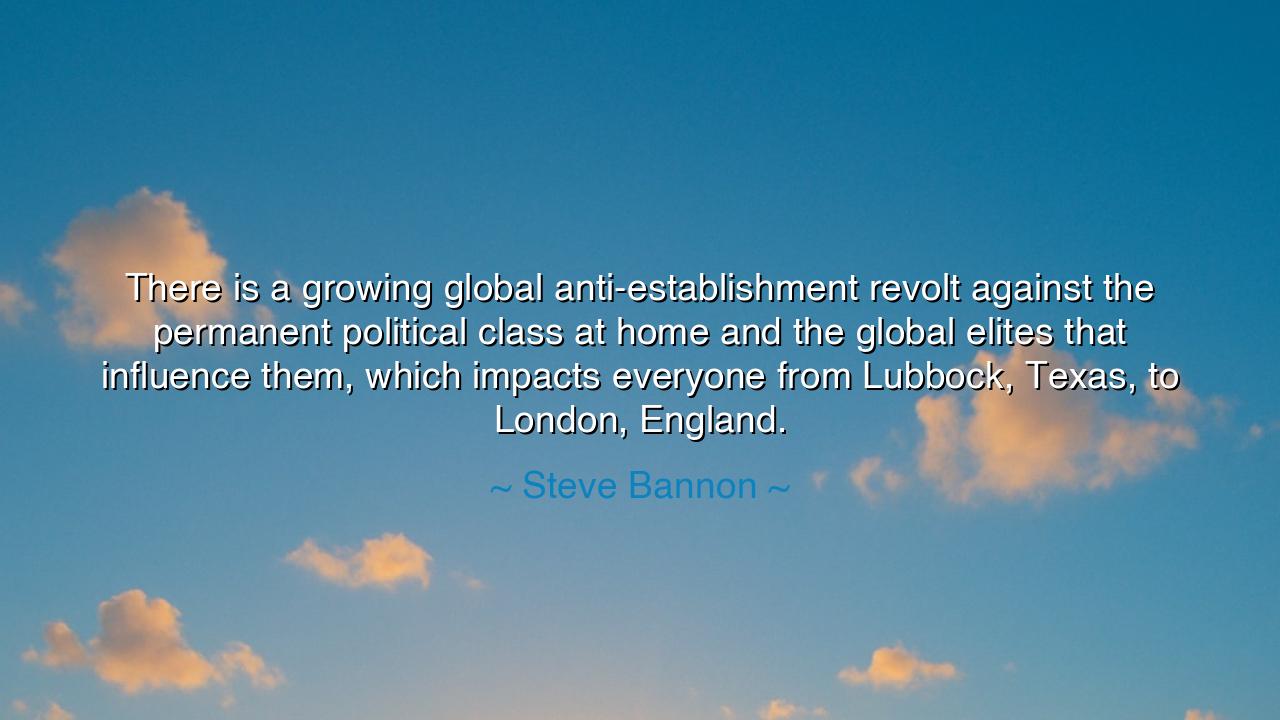
There is a growing global anti-establishment revolt against the
There is a growing global anti-establishment revolt against the permanent political class at home and the global elites that influence them, which impacts everyone from Lubbock, Texas, to London, England.






In the fiery and prophetic words of Steve Bannon, we hear the echo of an age-old struggle reborn in modern form: “There is a growing global anti-establishment revolt against the permanent political class at home and the global elites that influence them, which impacts everyone from Lubbock, Texas, to London, England.” This declaration, though born of our own time, carries the tone of the ancient uprisings that have shaken empires and remade civilizations. It speaks not only to politics, but to the eternal rhythm of history — the ceaseless cycle of power and rebellion, order and renewal. It is a call to awareness: that when the few rule for too long and forget the many, the world itself begins to shift beneath their feet.
The anti-establishment revolt Bannon speaks of is not new. Since the dawn of kings and empires, there has always risen a cry from the earth — the voice of the common man demanding to be heard. From the fields of Sparta to the streets of Paris, from the Gracchi brothers in Rome to the American Revolution, the story repeats: when leaders grow distant, when the ruling class governs for itself and not the governed, a reckoning stirs. What Bannon names in our modern age — the resistance to the “permanent political class” — is the ancient heartbeat of liberty, still alive beneath the weight of bureaucracy and wealth. It is the timeless desire of humanity to reclaim the right to shape its own destiny.
Yet his words also carry warning. For every revolt, noble or misguided, bears both fire and danger. The anger of the people is like a storm — it can purify, but it can also destroy. The elites he speaks of are not merely individuals but a system — a network of influence that transcends borders, weaving together power from Lubbock to London, from Washington to Brussels. This global order, though it has brought prosperity and innovation, has also created distance — a widening gulf between rulers and ruled, between those who decide and those who endure the consequences. The revolt, then, is the response of a world that feels unheard. It is the thunder of forgotten hearts.
History, too, bears witness to such turning points. Consider the fall of the Roman Republic, when the senate — rich, entrenched, and indifferent — lost the trust of its citizens. From this rot arose men like Julius Caesar, who promised to tear down the old order and return power to the people. And yet, in doing so, he replaced one form of tyranny with another. The lesson is as sharp now as it was then: rebellion without vision can devour its own children. To rise against corruption is noble, but to rebuild without wisdom is ruin. Thus, what Bannon describes is not merely a revolt — it is a test of civilization itself.
The origin of this quote lies in the shifting tides of the early twenty-first century — an era marked by populist movements, economic divides, and a growing sense that ordinary people have been silenced by systems too vast to touch. From Brexit in the United Kingdom to the waves of nationalism and reform in America, this global revolt has taken many forms — some righteous, some reckless. But beneath them all flows the same longing: a yearning to be seen, to matter again, to live in a world where power serves purpose, not privilege. Bannon’s words capture that spirit — not as a whisper, but as a war cry of a generation that refuses to be forgotten.
The ancient philosophers would have seen this not as chaos, but as balance restored. For Plato once warned that every government carries within it the seed of its opposite — that tyranny gives birth to rebellion, and aristocracy decays into oligarchy. The cycle of rise and renewal is as natural as the seasons. Yet the wise among us must learn to guide it, not merely to rage within it. The revolt must not be only against men, but against the spirit of corruption, complacency, and greed itself. Otherwise, the new rulers will become the old, and the fire will burn endlessly, consuming all it touches.
Let this be the lesson: when leaders forget humility, the people remind them of it. The house of power must never stand too far from the ground it rests upon, for the earth remembers who built it. Those who govern must serve, and those who follow must think — for freedom without wisdom is as perilous as tyranny without mercy. The revolt Bannon describes can either renew the world or unravel it, depending on the virtue of those who lead and the clarity of those who rise.
Action to take: question those who claim to rule for you, and question also those who promise to save you. Seek truth beyond slogans, and courage beyond anger. Participate, but do not hate; demand justice, but not vengeance. For as Steve Bannon’s words remind us, the age of upheaval is upon us — and in every age of revolt, it is not the loudest voice that shapes history, but the one that speaks with both passion and wisdom. When power and conscience walk together, the world moves not toward ruin, but toward renewal — and that, perhaps, is the truest revolution of all.






AAdministratorAdministrator
Welcome, honored guests. Please leave a comment, we will respond soon